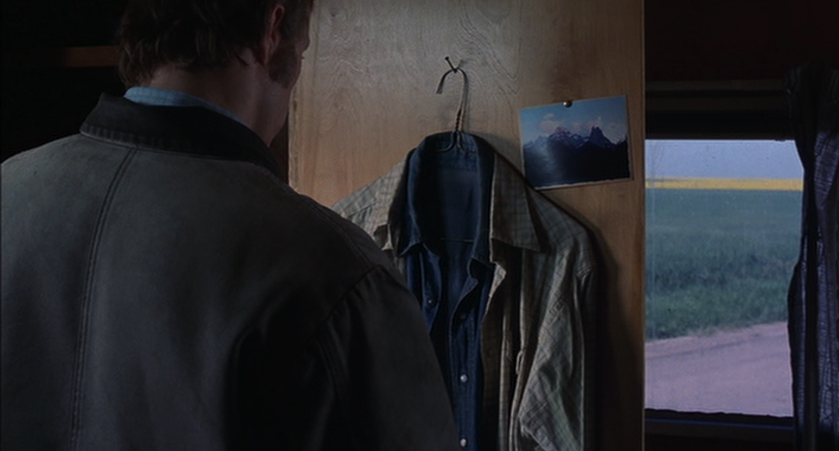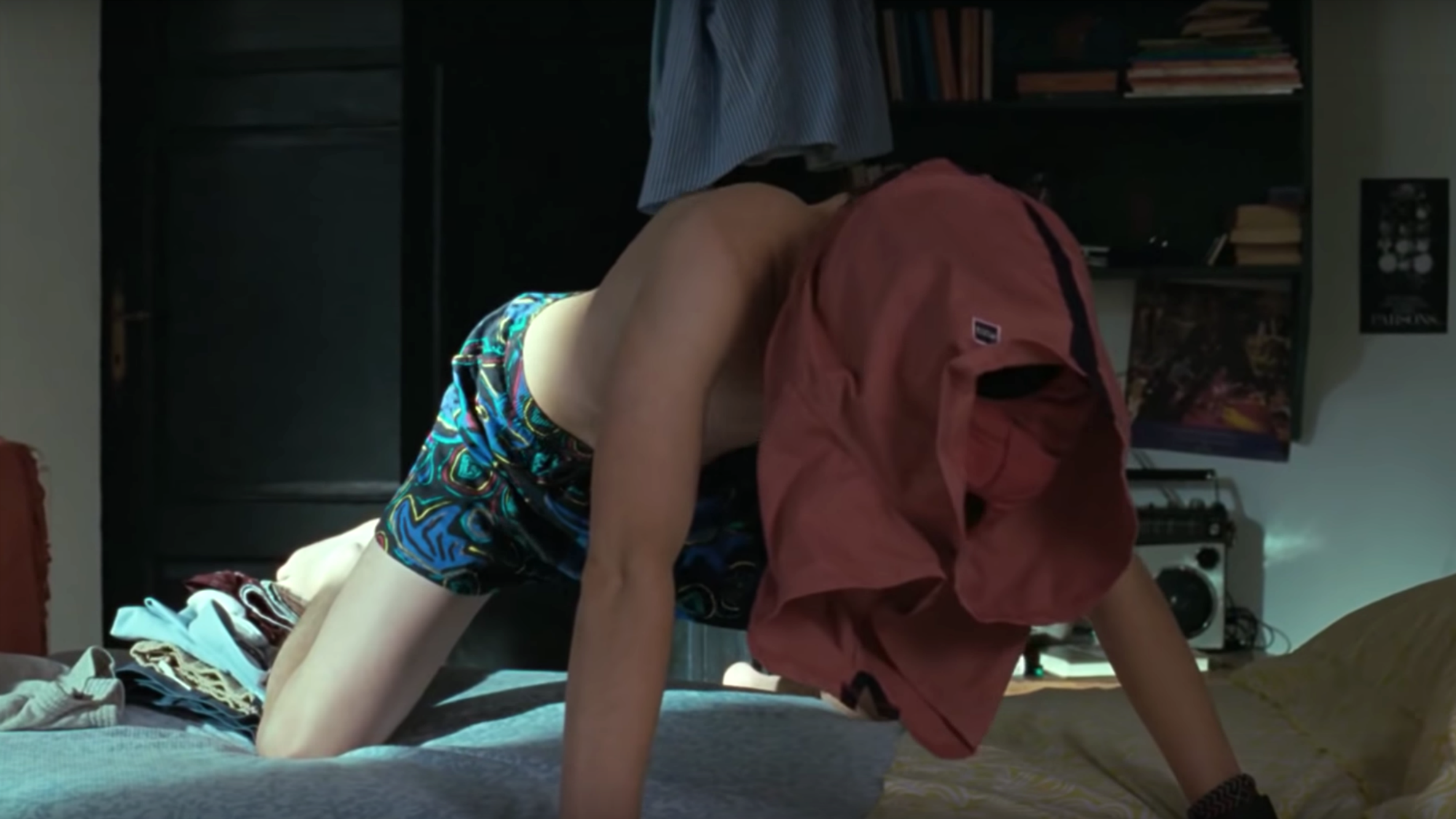Love makes us do weird things. Whether it’s obsessively checking for texts or fucking a peach, the heady throes of desire are as much a catalyst for experimentation as they are an internal, all-consuming feeling. It’s something explored in the new Georgian queer romance, And Then We Danced, in which Merab (Levan Gelbakhiani), a member of a traditional dance ensemble, makes the intrepid leap into first love with his rival, Irakli (Bachi Valishvili). As he explores these new, unfamiliar emotions, the usually single-minded Merab acts increasingly out-of-character as he tests whether his feelings are reciprocated: he steals Irakli’s earring, and begs on the street for small change so he can add enough credit on his phone to send a text.
But it was one moment in particular that, when I saw it recently, had me clutching my friend’s arm for dear life. Merab sees Irakli’s clothes lying on a bench in the changing rooms of the dance studio and, with only the slightest hesitation, he takes the other boy’s white t-shirt to his nose, inhales deeply, and then folds the shirt tidily, leaving it where he found it.
Watching a character sniff their crush’s clothes gives me an inexplicable serotonin boost like nothing else. And while this might seem odd to some, it’s becoming a more prominent trope, especially in LGBT cinema. TV Tropes, the database for plot conventions, calls this “perverted sniffing”, and describes it as an indication that someone – usually a male villain – has an “unhealthy and often very creepy attraction to” a young woman. But in queer romances, sniffing clothes doesn’t carry those depraved connotations; instead these films repurpose smelling as a tender act of affection, performed in solitude.
There’s intent and urgency behind taking a whiff. It’s so loaded with meaning because, well, who sniffs clothes outside of checking if your laundry is wearable? It suggests a person who is desperate for connection, but is so worried about how the other might respond that they turn to inanimate objects first. A nasal testing of the waters.
Taking a whiff of a piece of clothing is a specifically queer cinematic trope, because queer desire can only initially be performed in secrecy, far removed from the threat of the heteronormative gaze. When Merab and Irakli finally consummate their relationship, the voices of surly, drunken men can be heard in the background. The dangers of living in extremely conservative Georgia are ever present. It’s only in the sanctuary of the changing room, where Merab and Irakli arrive in the early hours of the morning before anyone else, that the former is free to smell a t-shirt without judgement.
Call Me By Your Name remarkably lacks a homophobic antagonist, or any societal pressure at all, but the first sign of Elio’s (Timothée Chalamet) attraction to Oliver (Armie Hammer) is expressed in the privacy of a bedroom, where Elio finds a pair of Oliver’s swimming trunks and wears them over his head, aroused by the musky scent of suntan lotion, chlorine and sweat. Before a character can initiate anything with the object of their desire, smell is usually the first physical act – that turning point where attraction no longer resides in someone’s head. This unexplored feeling becomes so overwhelming that it spills out in this uncharacteristic action.
It’s an erotic image too. In Heartbeats, King of Yearning Xavier Dolan competes for a boy’s affections with his female best friend, And though much of the film is a bitter and funny battle to impress the boy, its most potent display of desire is a solitary act. Dolan searches through a laundry pile, picking out a shirt and wrapping it around his head before masturbating to its intoxicating scent. There is a similar scene of self-pleasure in 2015’s Closet Monster, as a teen jacks off in a bathroom to the odour of a t-shirt belonging to his elusive love interest. The film, a surreal and violent depiction of internalised homophobia, also unpacks its transgressive implications, as the olfactory arousal triggers the unbearable pangs in his stomach that emerge whenever he feels desire for a man.
Clothes sniffing skews heavily male, but isn’t exclusive to men, with lesbian films like Carol and The Handmaiden also deploying the trope. Celine Sciamma’s exploration of adolescent lust, Water Lilies, takes smell to its most provocative limits. A young teen becomes increasingly obsessed with a girl named Floriane (played by Portrait of a Lady on Fire’s Adèle Haenel), and in a moment of recklessness, she steals Floriane’s rubbish, finding a used sanitary napkin which she briefly brings to her nose. Whether it’s sweat, semen or menstrual blood, no bodily fluid is safe from a curious nose.

Despite its sexual imagery, smelling holds more wholesome connotations than just olfactophilia (finding sexual pleasure from body odour – I googled that). A 2018 study suggests that sniffing a partner’s used clothing has a calming effect, while smell can become its own singular drug (effects include euphoria and serenity). And who can forget Heath Ledger’s devastating embrace of a denim shirt in Brokeback Mountain? Here, clothes become artefacts of remembrance, as Ennis clings to Jack’s (Jake Gyllenhaal) smell, the only trace left of him. Wearing the item of clothing can also become just as important as smelling it: a jumper in God’s Own Country; a buttoned shirt in Call Me By Your Name. It’s not just the bodily musk that people become attached to, but to mud, blood, grass and all the memories shared that produced that singular odour.
When clothes sniffing appears in ostensibly heterosexual films, the act disturbs the status quo, imbuing relationships with subtle homoeroticism. Tom Ripley pressing his face against a sleeping Dickie Greenleaf in The Talented Mr. Ripley, Mrs. Danvers caressing her employer’s underwear in Rebecca and Sal Mineo hugging James Dean’s jacket in Rebel Without a Cause.
Nothing encapsulates the full-sensory overload of first love like smelling used clothes as if they’re a Lush bath bomb. Sometimes it’s a quick sniff, a tentative exploration; other times, it’s a deep inhale, an indulgent attempt to learn everything about the object of their desire — but it stands as the most visceral symbol of the erotic thrill of queer love.

